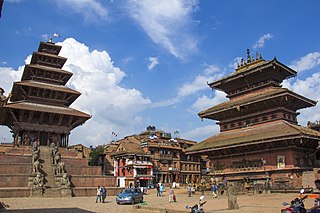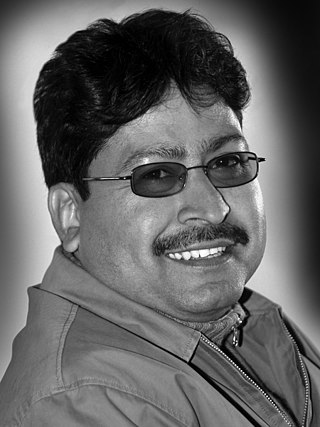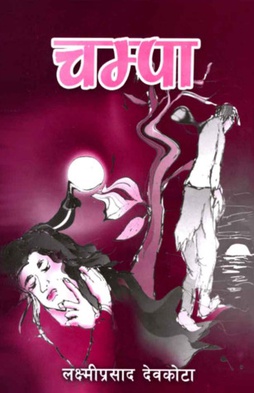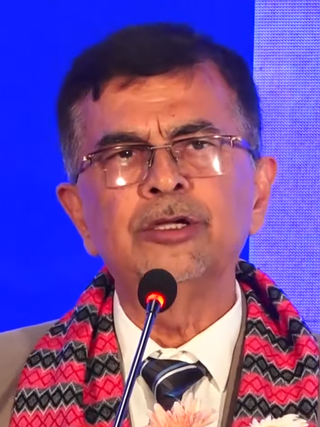
Bhaktapur, known locally as Khwopa and historically called Bhatgaon, is a city in the east corner of the Kathmandu Valley in Nepal located about 13 kilometres (8.1 mi) from the capital city, Kathmandu. Bhaktapur is the smallest city of Nepal as well the most densely populated. Along with Kathmandu and Lalitpur, Bhaktapur is one of the three main cities of the Kathmandu Valley and is a major Newar settlement of the country. The city is also known for its Newar tradition, cuisine and artisans. Bhaktapur suffered heavy damage in the April 2015 earthquake.

Laxmi Prasad Devkota (1909-1959) was a Nepali poet, playwright, novelist, and a politician. Honored with the title of Mahakabi in Nepali literature, he was known as a poet with a golden heart. He is considered to be one of the greatest and most famous literary figures in Nepal. Some of his popular works include the best-selling Muna Madan, along with Sulochana, Kunjini, Bhikhari, and Shakuntala.

The Prime Minister of Nepal is the head of government of Nepal. The prime minister is the head of the Council of Ministers of Nepal and the chief adviser to the President of Nepal.

Nepali literature refers to literature written in the Nepali language. The Nepali language has been the national language of Nepal since 1958.
Bharat Jangam, also known as Bharat Mani Jangam is a novelist and freelance journalist from Nepal. He is best known for the book Kalo Surya. Bharat Jangam is a creator of the "science of anticorruption" in the academic arena. His neo-science is based on modern problems of humans, which is approved Tribhuvan University, Kathmandu. He is also a Hindu activist. He currently lives in Kathmandu, Nepal. He has also been conferred the title of "Father of Anti-Corruption Science".

Shirishko Phool, published in 1964, is a Nepali language novel by Parijat. It was the author's first and most successful novel. It was awarded the Madan Puraskar in 1965.

Vishnu Raj Atreya was a Nepali writer and poet, who wrote in Nepali language, Sanskrit language and Awadhi language. He used the title Latosaathi in his poetry works since 1963 A.D. He is considered to be the first person to start writing Haiku in Sanskrit language.

Nayan Raj Pandey is a Nepali writer and screenwriter. He writes stories and novels, as well as screenplays for Nepali cinema. He is known for his representation of contemporary Nepalese society in his novels, presented in a figurative style. He received the Padmashree Sahitya Puraskar for his autobiographical book Yaar in 2017. Ulaar, Loo, Ghamkiri, and Sallipir are Pandey’s popular novels.

Champa is the only novel written by Laxmi Prasad Devkota. The book was written around the year 1947–48 and published posthumously 20 years later.

Rajendra Prasad Pandey is a Nepalese politician, belonging to the CPN currently serving as the Chief minister of Bagmati Province. He's also the deputy chairman of the CPN.

Loo is a 2012 Nepali novel by Nayan Raj Pandey. It is the fifth novel of the writer and was published in 2012 by Sangri~La Publication. The book was critically acclaimed and became a bestseller.

Dhanush Chandra Gautam, professionally known as Dha. Cha. Gotame was a Nepalese writer. He published multiple books and edited multiple newspaper and magazines in his lifetime. He won the prestigious Madan Puraskar for his novel Ghamka Pailaharu.

Mahakavi Devkota is a biographical book by Nityaraj Pandey. The book is about the life of poet Laxmi Prasad Devkota. The book was published in 1959 by Sajha Prakashan and won the Madan Puraskar for the same year. The book was published in the same year as Devkota died.

Prithiviraj Chauhan is a Nepali-language epic (mahakavya) by Mahakavi Laxmi Prasad Devkota. It was written in 1946 and was published in 2049 BS by Sajha Prakashan. It is based on the life of Prithviraj Chauhan. It is one of the six mahakavya composed by the poet. It is written in Jhyaurechhanda.

Badri Pandey is a Nepali politician belonging to Nepali Congress. He was a member of National assembly elected from 2018 elections. He was elected in 2022 from Bajura to the House of Representatives.

Sardar Rudra Raj Pande (1901–1987) was a Nepali educator, writer and historian. He served as the Headmaster of Durbar High School from 1925 to 1938, the Headmaster of Tri-Chandra College from 1938 to 1951 and the Vice Chancellor of Tribhuvan University from 1964 to 1969. He wrote multiple novels including Rupamati, which is considered as one of the earliest novels written in Nepali language. He also played an active role in establishing SLC examination board and Department of Archaeology.

Shanti Mishra was a Nepali lecturer, librarian, writer and translator. She was the first Nepali female full-time lecturer and first Nepali female librarian. She was the first female librarian of Tribhuvan University Central Library. She also served as the founding director of PEN chapter of Nepal.
















